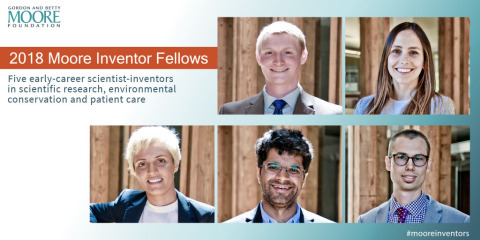PALO ALTO, Calif.--(BUSINESS WIRE)--The curiosity, passion and motivation of scientists and inventors inspires and drives change. Gordon Moore’s childhood passion for chemistry led him to a path of scientific invention that changed the world. This year’s Gordon and Betty Moore Foundation Moore Inventor Fellows hope to do the same. Today, the foundation announced its 2018 cohort of scientist-inventors for their inventions in scientific research, environmental conservation and patient care. They are engaged in research in wildlife identification, cancer tissue diagnosis, efficiency of solar modules and more.
“Gordon Moore had a deep passion for science and invention. It was this purpose and drive that helped fuel the digital revolution and provided part of the rich history of science and invention at the core of Silicon Valley,” said Harvey V. Fineberg, M.D., Ph.D., president of the Gordon and Betty Moore Foundation. “These young inventors show great promise for creating positive outcomes for future generations.”
Moore Inventor Fellows supports early-career scientist-inventors working on innovative projects with the potential to bring about significant change. Since its inception in 2016, Moore Inventor Fellows has supported early-career scientist-inventors at a critical stage of research, by giving them the resources and freedom to test their ideas. This year, to diversify the applicant portfolio, nominees were sought from select research institutions in addition to universities.
Each fellow receives a total of $825,000 over three years to drive their invention forward, including $50,000 per year from their home institution. Starting with five fellows in 2016 and five more in 2017, the foundation plans to allocate nearly $34 million through 2026 to support 50 Moore Inventor Fellows.
“Ample resources, flexibility and freedom help early-career researchers to thrive,” said Robert Kirshner, Ph.D., chief program officer of science at the Gordon and Betty Moore Foundation. “Moore Inventor Fellows provides support for passionate researchers to develop inventions that could create lasting change.”
2018 Moore Inventor Fellows
Victor Brar, Ph.D., assistant professor, physics, University of Wisconsin-Madison
Victor Brar’s work is at the forefront of condensed matter research. His invention is a novel optical metasurface that generates infrared light. This holds the promise of a low-cost and efficient method for chemical sensing and for communication.
Livia Schiavinato Eberlin, Ph.D., assistant professor, chemistry, University of Texas at Austin
Livia Eberlin exploits mass spectrometry for rapid and accurate identification of cancer cells. She is engineering a handheld device that uses chemical analysis and machine learning methods to identify cancer cells on-the-spot in operating rooms.
Zachary Holman, Ph.D., assistant professor, electrical engineering, Arizona State University
Zachary Holman’s invention transforms surfaces by coating them with thin layers of functional nanomaterials. These coatings tailor the way the surface interacts with light, heat and electricity to accelerate the deployment of solar energy by doubling the efficiency of solar modules.
Hal Holmes, Ph.D., lead engineer, DNA Barcode Project, Conservation X Labs
Hal Holmes’ invention is a handheld, battery-powered, screening tool that enables someone without technical training to perform an automated DNA test to identify wildlife products right in the field. This invention will exploit genetic testing and technology for conservation and has the potential to monitor and prevent illegal trafficking of timber and wildlife products.
Prineha Narang, Ph.D., assistant professor, computational materials science, Harvard University
Prineha Narang’s research has pioneered new states of matter created when light interacts with materials. Her invention, a tiny quantum sensor, uses a novel and previously unexplored interaction mechanism between light and molecules to sense and identify individual molecules. If successful, this invention could speed the accurate identification of environmental toxins.
The Gordon and Betty Moore Foundation fosters path-breaking scientific discovery, environmental conservation, patient care improvements and the preservation of the special character of the Bay Area.

